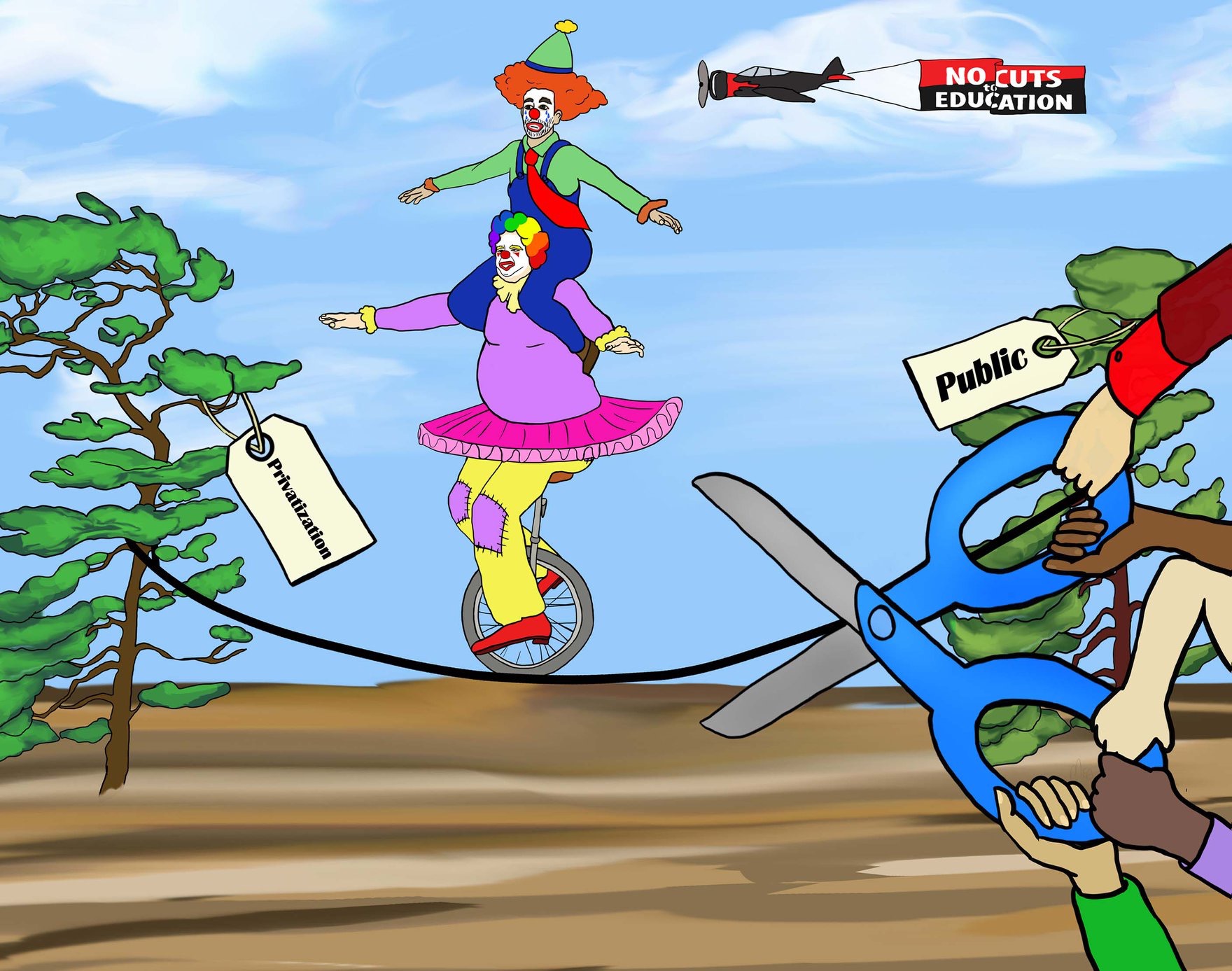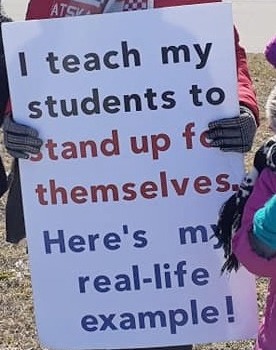|
March 12, 2020
Resistance to Anti-Social Reforms to
Education in Ontario
Disingenuous Public Relations Campaign to
Hide Degradation and Privatization
of Public Education

Education workers out in force at the
Ontario PC policy convention,
Niagara Falls, February 22, 2020.
• Oppose
Attempts to Eliminate Our Voice -
Enver Villamizar
• Let Educators Continue
to Speak and Act in Their Own Name -
Laura Chesnik
• Annual Meetings of
Education Unions: Challenges Facing Teachers
and Education Workers
• Forum on E-Learning in
Windsor
Quebec
Crane Operators Voice Safety Concerns
• Campaign to Restore
Mandatory Crane Operator Vocational Training
- Pierre Chénier
Resistance to Anti-Social
Reforms to Education in Ontario

Mass picket surrounds Queen's Park as education
workers across the province from all four unions
go on strike together February 21, 2020, against
Ford government's cuts to education.
Nearly one year ago the Ford government
announced its arbitrary, unilateral and
anti-social changes to Ontario's education
system. These include:
- increases in class size averages for grades
9-12 from 22:1 to 28:1;
- mandatory e-learning requirements for high
school graduation;
- the elimination of funding for local
priorities of school boards; and
- the elimination of any previously agreed-to
exceptions to the 24.5:1 class size average in
grades 4-8.

Click to enlarge.
|
The
Ontario
government appears now to be making further
changes, which it claims are concessions on its
part to the unions so they stop their ongoing
strikes. On March 3, Education Minister Stephen
Lecce held a press conference where he presented
as "concessions" new arbitrary changes to the
government's imposed measures.
These changes made without negotiating with the
unions involved include:
- a grade 9-12 average class size increase to
23:1;
- mandatory e-learning with an option for
parents to opt-out their children; and
- the re-establishment of the local priorities
fund under a new name but with the elimination
of any input on the use of the funds from the
unions representing teachers and education
workers.
Besides proving that the strikes of teachers
and education workers have forced the government
to try new schemes to impose its agenda, the
government's latest announcements again show
that one of its main aims is to make clear that
it does not think teachers and education workers
have a right to negotiate their wages and
working conditions, which are their students'
learning conditions. Even in retreat, the
government struggles to assert its unilateral
control over decision-making and the direction
of education to the exclusion of education
workers, students, parents and other concerned
Ontarians.
The announcement by Lecce came just days after
the government faced a challenge to its
arbitrary one-year-ago announcement on class
size changes from the Ontario English Catholic
Teachers' Association (OECTA). OECTA asserts
that the government is not bargaining in good
faith as it is ruling through regulatory changes
instead of negotiating these matters with those
who will be forced to work under the changes.
Clearly, these new arbitrary changes are an
assertion that it does not need to negotiate and
is a signal to the Ontario Labour Relations
Board (OLRB) Chair who is hearing the case that
he had better affirm the government's will.
 The government has often cited
public consultations it held prior to its March
15, 2019 announcements to claim it has a mandate
for all its anti-social changes. Ironically, the
government has been tireless in keeping the
content of those consultations secret. Once the
results were finally revealed, thanks to OECTA's
challenge at the OLRB, they put the lie to the
government's claims that it is acting on what
parents told it during the consultations. The
results of those consultations reveal that
despite the government's best efforts, it has
not been able to destroy public opinion, which
sees increased class sizes and mandatory
e-learning as attacks on the society and the
youth in particular. Now, instead of backing
down and conceding to public opinion, the
government is attempting to divert from what is
being revealed by making further arbitrary
announcements. The government has often cited
public consultations it held prior to its March
15, 2019 announcements to claim it has a mandate
for all its anti-social changes. Ironically, the
government has been tireless in keeping the
content of those consultations secret. Once the
results were finally revealed, thanks to OECTA's
challenge at the OLRB, they put the lie to the
government's claims that it is acting on what
parents told it during the consultations. The
results of those consultations reveal that
despite the government's best efforts, it has
not been able to destroy public opinion, which
sees increased class sizes and mandatory
e-learning as attacks on the society and the
youth in particular. Now, instead of backing
down and conceding to public opinion, the
government is attempting to divert from what is
being revealed by making further arbitrary
announcements.
The announcements are clearly a reaction to the
government's crisis of its own making. It thinks
that a public relations campaign will save it
from reality. Through these tweaks to its
original attacks on education, the government is
seeking to hide its direction to undermine
education. Its proposals to allow parents to opt
out of mandatory e-learning, for example, hide a
reversion to plan B -- to impose e-learning
through the number and kind of classes
that will be funded. School boards will be
required to offer more e-learning courses, which
have a class size average of 35 students to one
teacher. Parents will then be presented with the
"choice" of opting their children out of
mandatory e-learning only to find that the
courses their children want or need to graduate
will not be offered in a physical classroom.
This method of using its control over funding to
force school boards to more consistently adopt
e-learning was leaked by the Toronto Star
recently as the government's initial plan A,
which is now presented as a plan B "concession."
As for its claims to be maintaining existing
class size averages by moving to 23:1, this too
hides what the government is actually doing. It
has shown in negotiations that it wants to
eliminate local class size caps that exist in
some but not all local collective agreements. An
increase in class size averages for next year to
23:1 without capping the maximum class size at
23:1 enshrines what it has done since March 15
of last year. This average does not address the
issue of capping the size of individual classes.
Only through imposing a maximum class size can
manipulation of averages be prevented. To have
some small classes and some large ones, which in
combination meet a required school board-wide
average of 23:1 defeats the initiative and
desire to keep the size of all classes under an
agreed upon maximum number of students.
 Lastly its
re-introduction of a previously negotiated fund
called the "Local Priorities Fund" under a new
name "Support for Students Fund" hides that the
education unions fought for and won this funding
initiative over which they had some control. The
desire of teachers and their unions was to put
this funding towards supporting the most
vulnerable students with special needs through
the hiring of educational assistants, child and
youth workers, and other support staff who are
the lifeblood of special education. The "Support
for Students Fund" removes the unions and
teachers from having any role over how the funds
will be deployed, which means school boards will
be able to use them as they see fit, outside of
any requirement to negotiate with those who
provide the education. Lastly its
re-introduction of a previously negotiated fund
called the "Local Priorities Fund" under a new
name "Support for Students Fund" hides that the
education unions fought for and won this funding
initiative over which they had some control. The
desire of teachers and their unions was to put
this funding towards supporting the most
vulnerable students with special needs through
the hiring of educational assistants, child and
youth workers, and other support staff who are
the lifeblood of special education. The "Support
for Students Fund" removes the unions and
teachers from having any role over how the funds
will be deployed, which means school boards will
be able to use them as they see fit, outside of
any requirement to negotiate with those who
provide the education.
The resistance of teachers and all education
workers is the main factor forcing the
government to shift tactics in its public
relations campaign. Public relations is not
politics. As practiced by the current government
it is a form of manipulation to try to disinform
existing public opinion and present "down" as
"up." It is a dark art, which seems to be the
profession of this government of Ontario and its
Minister of Education. However, no matter how
slick the Minister appears, he is fighting
against a growing tide of human beings who will
not accept backwardness as progress because they
know from their own experience what is required
to improve education and are speaking for
themselves.

"Cut the Clowning" by Megan Simon-Beaudoin

- Enver Villamizar -
A challenge facing teachers and education
workers as they come together for the annual
meetings of the Ontario Secondary School
Teachers' Federation and the Ontario English
Catholic Teachers' Association is the necessity
to expose and oppose the attempts to eliminate
teachers' and education workers' decision-making
authority over their day-to-day working
conditions, which are students' learning
conditions. Step by step since the 1990s the
ruling class has moved to curtail the right of
teachers and education workers as well as
locally elected trustees to decide what happens
in education. In order to extract billions from
funds dedicated for K-12 education, and turn
education into an arena for profit-making by
global technology, childcare and education
monopolies, the legal right of teachers and
education workers and elected trustees to say
No! has been eroded to the point that
negotiations over local working conditions
between locally-empowered unions and school
boards has been all but eliminated.
 This round of negotiations is aimed
at codifying the grip of the provincial cabinet
over all decisions of substance. This includes
their desire to establish new ways of changing
the content of what students learn to better
serve the private monopolies that want
"just-in-time" changes to how the youth are
educated. The great fear of the ruling class is
that teachers and education workers will not
submit and will find new ways to break out of
the limitations being imposed on them. This round of negotiations is aimed
at codifying the grip of the provincial cabinet
over all decisions of substance. This includes
their desire to establish new ways of changing
the content of what students learn to better
serve the private monopolies that want
"just-in-time" changes to how the youth are
educated. The great fear of the ruling class is
that teachers and education workers will not
submit and will find new ways to break out of
the limitations being imposed on them.
The recent ruling by the Ontario Labour
Relations Board codifying that all matters
related to money in education are to be
negotiated centrally, and the ongoing hearings
on whether the government has the right to
dictate class sizes through regulation without
negotiation are two examples of the new
precedents being set in this round. Another is
the constant refrain from the Ford government
that under governments of all stripes it is the
teachers and education workers who are the
problem, not the anti-social offensive these
governments all pursue in their own ways. The
Ford government is trying to lay the groundwork
to eliminate the legal right to strike of
teachers and education workers, by which it
hopes to permanently subdue their resistance to
its schemes to further privatize public
education.
This situation shows the importance of
education workers speaking out about these
matters and establishing new ways of organizing
within and outside the structures that exist
such as union affiliation, job classes,
geographic location etc. so as to ensure that
their united No!
to cuts and privatization cannot be suppressed.
Giving expression to this No! through
new forms of organizing will clearly show that,
try as they might, those who want to usurp the
decision-making power of the working people
cannot eliminate their No, which is their right
to speak and act in their own name -- a
fundamental human right.
Around the world and across Canada teachers and
education workers have become a front line of
defence against the neo-liberal wrecking of
their societies. They stand as a bulwark against
privatization and other neo-liberal reforms
because they see the consequences of it every
day and bear the brunt of the breakdown of
society and the social fabric which necessarily
results from the attempt to make everyone fend
for themselves. The more that teachers and
education workers stick to their direct
experience and fight for solutions to the
problems they see day in and day out, including
how education should be funded and to what
level, the more they will overcome all the
attempts to divert their ranks and eliminate
their voice, and through this will find a way
forward to once and for all go from resistance
to decision-making power. It can be done!

- Laura Chesnik -
One challenge facing the movement for workers'
rights and the right to education is to ensure
the system of representative democracy does not
divert it into a blind alley. In the lead-up to
the 2022 provincial election, representative
democracy and its cartel parties will try to
divert any independent movement into becoming a
vote bank for one of the parties vying for
positions of power in the Legislature.
At the present time, no alternative is being put
forward within the Legislature to the
neo-liberal austerity agenda. Working people
themselves and their independent movement have
brought an alternative agenda into being and are
pushing it through their actions and voice.
The cartel parties both provincially and
federally base themselves on the neo-liberal
assumption that workers are a cost of production
and that the government's role is to ensure
monopoly right and paying the rich are upheld
above all else. They assert that only through
their neo-liberal prejudice can the economy
prosper.
 Reduce the "cost" of workers and
put those saved funds into the hands of the rich
is the mantra, and voilà, the economy
will blossom. Of course, the cartel parties
argue over how best to do this and who should be
in control in doling out public funds to the
rich. They try to embroil the workers in
choosing which cartel party to vote for and
whose policies they should prefer and would be
best or even the lesser evil for working people
and society. They seek to provide their
illegitimate austerity agenda with legitimacy.
Needless to say, this neo-liberal outlook has
not permitted any of the ongoing and persistent
problems plaguing Ontario's economy and
education system to be resolved in a manner that
favours the people. Reduce the "cost" of workers and
put those saved funds into the hands of the rich
is the mantra, and voilà, the economy
will blossom. Of course, the cartel parties
argue over how best to do this and who should be
in control in doling out public funds to the
rich. They try to embroil the workers in
choosing which cartel party to vote for and
whose policies they should prefer and would be
best or even the lesser evil for working people
and society. They seek to provide their
illegitimate austerity agenda with legitimacy.
Needless to say, this neo-liberal outlook has
not permitted any of the ongoing and persistent
problems plaguing Ontario's economy and
education system to be resolved in a manner that
favours the people.
The way the electoral system operates, the
cartel parties are supposed to do everything in
their power to try and appear as representatives
of the workers' movement and curry favour with
this or that group in hopes of winning the
election. Once elected they are free to declare
that funds for education and other public
services must be cut, either because new
investments are allegedly not possible, or
because cuts are inevitable given the size of
the debt and deficit, which of course must be
serviced and even increased because the
institutions of the rich profit from it. In this
way of governing, the voice of the working
people is not supposed to have its own
expression. It is just supposed to become the
echo of what the various cartel parties claim
are the issues, solutions and agenda.
More and more, teachers and other education
workers have shown that they are quite capable
of thinking for themselves and speaking for
themselves on what is required in Ontario to
improve the education system and solve its
problems so it becomes a truly modern system
that guarantees the right to education for all
at the highest possible level. They have shown
this in both their resistance to the austerity
agenda of the rich and in the electoral arena.
During the strike actions in Ontario over the
past few months, teachers and education workers
have also broken through the notion that they
are just a pressure group that looks for good
media coverage and for things to happen beyond
their control. They have taken up speaking for
themselves and mobilizing public opinion on
their own terms. They have begun to use new
forms and technology to create their own forums
to unite and fight for their rights and the
rights of all and forge a way forward that
favours the people and not the financial
oligarchy.
The experience of having a teacher as an
independent candidate in Windsor-Tecumseh in the
last provincial election also shows that
education workers are not leaving the political
arena to others from the cartel parties to
occupy and use to divert people from presenting
their own agenda based on their own outlook.
All these experiences stand the movement in good
stead and are becoming a bulwark against the
efforts and noise of the cartel party system to
block the movement's advance and divert it into
giving up its own initiative, outlook, agenda
and voice, and accepting the choices the
electoral system of representative democracy
imposes on the people.
Sticking to their own experience and independent
agenda and continuing to act and speak in their
own name and not through this or that cartel
party representative are key to teachers and
other education workers moving forward.

The Ontario Secondary School Teachers'
Federation and the Ontario English Catholic
Teachers' Association will hold their annual
general meetings on March 13 to 16. [As this
paper went to press, it was announced on March
12 by both OSSTF and OECTA that due to
concerns regarding the spread of the COVID-19
pandemic, their annual meetings that were to
be held in Toronto in the coming days have
been postponed -- WF Ed. Note.] Thousands
of delegates from around the province will
discuss and debate issues of concern. The
meetings take place in the midst of ongoing
strike actions of teachers and education workers
in the K-12 and adult education systems whose
unions have been trying to negotiate new
contracts for their members. They are up against
a government determined to rule by regulation
using its prerogative powers to impose what it
wants in defiance of public opinion and
research, and which refuses to uphold its social
responsibility for the welfare of the youth and
the modern right of education for all.
The meetings are also taking place in advance
of the release of a budget by the Ford
government and on the heels of the election of a
new leader of the Liberal Party of Ontario,
Stephen Del Duca, who some claim represents a
"shift to the right" for that party.
On the minds of many teachers and education
workers is how to advance their ongoing and
persistent fight for their right to negotiate
their wages and working conditions and solve the
problems plaguing the education system in
Ontario under the circumstances of a
government-led anti-social offensive. The
teachers and education workers have taken up the
challenge to be the front line of defence
against the wrecking of public education and
have made great strides in overcoming divisions
among their unions and those in different job
categories. The work they all do is vital for
ensuring that the youth are educated and safe in
both mind and body. The one-day united picket
lines of teachers and education workers across
the province on February 21 is a sign that the
divisions of the past fueled by the cartel party
system no longer suffice to keep this movement
in check and fighting among itself rather than
using its collective strength to ensure its
demands are met.
Workers' Forum has full confidence
that, through their deliberations and
independent organizing, teachers and education
workers in Ontario will continue to advance and
make a great contribution to strengthening
society and the modern right of education for
all at the highest level.


Teachers for Global Awareness and the
Education Is a Right Podcast held a community
forum on e-learning in Ontario on February 29.
The forum in Windsor featured a keynote address
by Dr. Beyhan Farhadi discussing her PhD
dissertation on e-learning at the Toronto
District School Board, North America's second
largest school board. The forum also brought
together other e-learning teachers and students
from Ontario as well as Michigan where taking
one class through e-learning is mandatory. The
proceedings are being broadcast as podcasts by
Education Is a Right Podcast available at edisaright.ca.
The forum informed participants about existing
experiences with e-learning and addressed how
mandating such courses for graduation would
affect the youth. Many aspects of e-learning
were raised by panelists and audience members,
opening up the discussion on this important
matter. A significant point made was that no
one, not even those who work in e-learning and
advocate for its use on a broader basis,
believes that making it mandatory will improve
the quality of education. Another issue raised
was how e-learning is a way for large companies
to extract value from education and gain control
over what and how students learn. Members of the
audience also provided important experiences
from those teaching online courses, including
the effect on metacognition, or how students
think about their own learning, and the effect
on teachers and students of the massive dropout
rate for those courses currently.


Quebec Crane Operators Voice
Safety Concerns
- Pierre Chénier -
 Quebec crane operators
are stepping up their interventions to mobilize
public opinion to force the Quebec government
and the Quebec Construction Commission (CCQ) to
stop their abuse of power and restore mandatory
crane operator vocational training. The efforts
of the crane operators and their union have
convinced certain mass media to begin publishing
reports that provide actual information on the
situation. The Journal de Montréal on March
7, published an article entitled "Lack of
Training Results in a Series of Crane Operator
Accidents." Evans Dupuis, President of the Union
of Crane Operators, was interviewed on
television, where he spoke about the situation
since the government and the CCQ lowered the
training level required to become a crane
operator. Quebec crane operators
are stepping up their interventions to mobilize
public opinion to force the Quebec government
and the Quebec Construction Commission (CCQ) to
stop their abuse of power and restore mandatory
crane operator vocational training. The efforts
of the crane operators and their union have
convinced certain mass media to begin publishing
reports that provide actual information on the
situation. The Journal de Montréal on March
7, published an article entitled "Lack of
Training Results in a Series of Crane Operator
Accidents." Evans Dupuis, President of the Union
of Crane Operators, was interviewed on
television, where he spoke about the situation
since the government and the CCQ lowered the
training level required to become a crane
operator.
Workers' Forum congratulates the crane
operators for persisting in this just work to
break through the wall of silence on their
conditions. The fight they are waging for their
own safety as well as the safety of all is of
great importance.
The public has also become more aware that
accidents involving cranes have increased since
the new regulations abolished the mandatory
870-hour Diploma of Vocational Studies (DEP).
The people are becoming aware of the arbitrary
and abusive nature of the new regulations, which
were introduced without the input or consent of
crane operators and construction workers.
Construction workers have strongly denounced the
fact that the change was not discussed or
negotiated with them but imposed by the
government and the CCQ even though it directly
impacts their well-being.
The government and the CCQ gave themselves the
right to replace the 870-hour mandatory
vocational training program with a broadly
inferior one directly controlled by the
construction companies. The weakening of the
training standard is a blatant conflict of
interest involving the construction companies.
The government and the CCQ have pushed the
change through using the power of the state
machine even though this endangers the lives of
workers and the public. The methods used to do
this without the consent of the workers includes
an apparatus of propaganda and disinformation to
present the lowering of the level of training as
a necessary measure to deal with a labour
shortage.
Construction workers have consistently exposed
the fraudulent and reckless connection the
government and CCQ have made between any
perceived shortage of workers and the necessity
to have proper training of crane operators. With
regards to a so-called crane operator labour
shortage, the President of the Union of Crane
Operators has pointed out that throughout 2019
almost one out of six available crane operators
worked fewer than 500 hours.
|
 Boom-truck
overturned in Laval, Boom-truck
overturned in Laval,
September 2019
|
The Journal de Montréal article
describes the six accidents that have occurred
in Quebec involving the operation of a crane
since last September. In all cases, the person
operating the crane had not obtained a DEP. The
article also quotes a spokesperson for the
Quebec Association of Structural Formwork
Entrepreneurs who exposes the charade of the
company training that has replaced the mandatory
DEP. The entrepreneur admits that someone such
as himself is not in a position to train
aspiring crane operators in all the situations
they will encounter during their work. At most,
all the company can do is show them how to pull
the levers. According to the entrepreneur, the
870 hours of professional training are in
reality a "minimum."
The article also refers to government data
showing that vocational training in all trades
in Quebec is on the decline. According to
figures provided by the Ministry of Education,
programs for all trades have 8,800 fewer
students today than in 2014-2015.
Before the government's unilateral change in
2018, professional training was mandatory for
someone to become a crane operator. Since the
imposition of the new regulations, the number of
crane operators without professional training is
more than those who have successfully completed
training and received a DEP. Without a mandatory
professional character, all talk of on-site
training in any trade is a fraud and arbitrary.
The government and agencies such as the CCQ are
deprofessionalizing the construction and other
trades in the service of large companies. They
are using such methods to force down wages and
allow those who own and control the construction
sector to manipulate the working class in favour
of their own narrow private interests without
regard for safety and other important issues.
The government cannot escape the blame and
shame for the increase in accidents involving
the operation of cranes. Public opinion is
becoming more informed through the interventions
of the crane operators and construction unions
with pressure mounting on the government to back
down and reinstate mandatory crane operator
vocational training.

(To access articles
individually click on the black headline.)
PDF
PREVIOUS ISSUES
| HOME
Website: www.cpcml.ca
Email: office@cpcml.ca
|



 Lastly its
re-introduction of a previously negotiated fund
called the "Local Priorities Fund" under a new
name "Support for Students Fund" hides that the
education unions fought for and won this funding
initiative over which they had some control. The
desire of teachers and their unions was to put
this funding towards supporting the most
vulnerable students with special needs through
the hiring of educational assistants, child and
youth workers, and other support staff who are
the lifeblood of special education. The "Support
for Students Fund" removes the unions and
teachers from having any role over how the funds
will be deployed, which means school boards will
be able to use them as they see fit, outside of
any requirement to negotiate with those who
provide the education.
Lastly its
re-introduction of a previously negotiated fund
called the "Local Priorities Fund" under a new
name "Support for Students Fund" hides that the
education unions fought for and won this funding
initiative over which they had some control. The
desire of teachers and their unions was to put
this funding towards supporting the most
vulnerable students with special needs through
the hiring of educational assistants, child and
youth workers, and other support staff who are
the lifeblood of special education. The "Support
for Students Fund" removes the unions and
teachers from having any role over how the funds
will be deployed, which means school boards will
be able to use them as they see fit, outside of
any requirement to negotiate with those who
provide the education.
 Reduce the "cost" of workers and
put those saved funds into the hands of the rich
is the mantra, and voilà, the economy
will blossom. Of course, the cartel parties
argue over how best to do this and who should be
in control in doling out public funds to the
rich. They try to embroil the workers in
choosing which cartel party to vote for and
whose policies they should prefer and would be
best or even the lesser evil for working people
and society. They seek to provide their
illegitimate austerity agenda with legitimacy.
Needless to say, this neo-liberal outlook has
not permitted any of the ongoing and persistent
problems plaguing Ontario's economy and
education system to be resolved in a manner that
favours the people.
Reduce the "cost" of workers and
put those saved funds into the hands of the rich
is the mantra, and voilà, the economy
will blossom. Of course, the cartel parties
argue over how best to do this and who should be
in control in doling out public funds to the
rich. They try to embroil the workers in
choosing which cartel party to vote for and
whose policies they should prefer and would be
best or even the lesser evil for working people
and society. They seek to provide their
illegitimate austerity agenda with legitimacy.
Needless to say, this neo-liberal outlook has
not permitted any of the ongoing and persistent
problems plaguing Ontario's economy and
education system to be resolved in a manner that
favours the people.

 Boom-truck
overturned in Laval,
Boom-truck
overturned in Laval,